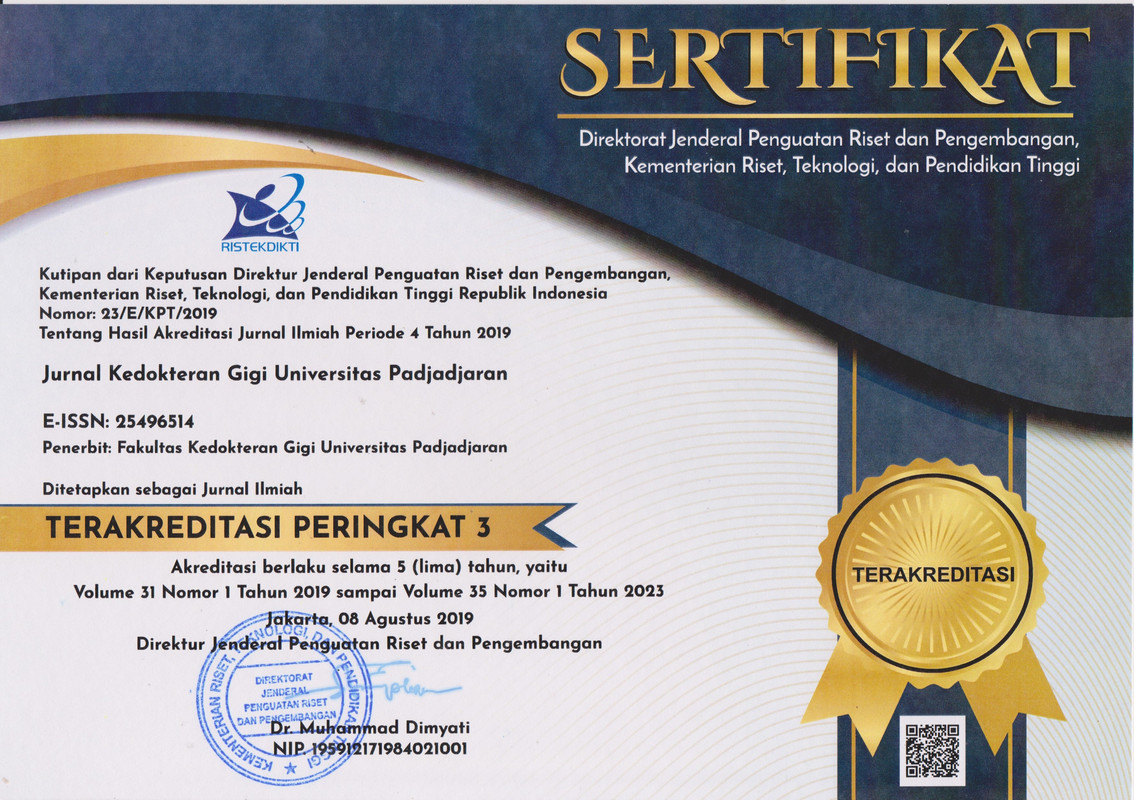Effect of polishing paste on color stability of nanohybrid and spherical filler composite after immersion in black tea: a laboratory experiment
Abstract
Pengaruh pasta poles terhadap stabilitas warna komposit dengan filler nanohybrid dan spherical setelah perendaman di dalam teh hitam: eksperimental laboratoris
Pendahuluan: Karakteristik filler resin komposit secara langsung mempengaruhi kekasaran permukaan dan kerentanan terhadap pewarnaan ekstrinsik. Restorasi resin komposit yang estetik bergantung pada stabilitas warna, yang berkaitan dengan kehalusan permukaan. Oleh karena itu, penerapan pemolesan yang tepat sangatlah penting dalam restorasi resin komposit. Penelitian ini bertujuan untuk menentukan pengaruh pasta poles terhadap stabilitas warna komposit nanohybrid dan spherical setelah perendaman dalam teh hitam. Metode: Empat puluh dua spesimen berbentuk silinder dengan diameter 6mm dan tebal 2mm dipersiapkan dari resin komposit nanohybrid (Filtek Z250XT) dan spherical filler (Palfique Omnichroma) kemudian dibagi ke dalam 4 subkelompok yang diberikan perlakuan pemolesan berbeda dan 2 sub kelompok kontrol tanpa pemolesan. Kelompok tersebut adalah: nanohybrid tanpa pemolesan (N-K), spherical filler tanpa pemolesan (SF-K), nanohybrid dipoles dengan disc (N-Pd), spherical filler dipoles dengan disc (SF-Pd), nanohybrid dipoles dengan disc diikuti pasta (N-PdP), dan spherical filler dipoles dengan disc diikuti pasta (SF-PdP). Spesimen direndam dalam teh hitam selama 7 hari. Warna awal dan akhir diukur menggunakan colorimeter. Data dianalisis menggunakan uji One-Way ANOVA dan Post Hoc Tamhane. Hasil: Perendaman dalam teh hitam menghasilkan perubahan warna yang tidak dapat diterima secara klinis, kecuali pada kelompok N-PdP. Kelompok N-K menunjukkan nilai ∆E* terbesar, sementara kelompok N-PdP menunjukkan nilai ∆E* terkecil. Simpulan: Penggunaan pasta poles mengurangi perubahan warna resin komposit akibat teh hitam. Resin komposit nanohybrid yang dipoles menggunakan disc diikuti pasta menunjukkan ketahanan yang lebih baik terhadap perubahan warna.
Keywords
Full Text:
PDFReferences
Strini BS, Marques JF de L, Pereira R, Sobral-Souza DF, Pecorari VGA, Liporoni PCS, et al. Comparative Evaluation of Bulk-Fill Composite Resins: Knoop Microhardness, Diametral Tensile Strength and Degree of Conversion. CCIDE. 2022(14):225–33. https://doi.org/ 10.2147/CCIDE.S376195
Ronald LS, John MP. Craig’s Restorative Dental Materials. 14th ed. Philadelphia, PA: Mosby Elsevier; 2019. p. 139-143.
Iyer RS, Babani VR, Yaman P, Dennison J. Color match using instrumental and visual methods for single, group, and multi‐shade composite resins. J Esthet Restor Dent. 2021 Mar;33(2):394–400. https://doi.org/10.1111/jerd.12621
El-Rashidy AA, Shaalan O, Abdelraouf RM, Habib NA. Effect of immersion and thermocycling in different beverages on the surface roughness of single- and multi-shade resin composites. BMC Oral Health. 2023;23(1):367. https://doi.org/10.1186/s12903-023-03069-w
Lucena C, Ruiz-López J, Pulgar R, Della Bona A, Pérez MM. Optical behavior of one-shaded resin-based composites. Dent Mater. 2021;37(5):840–8. https://doi.org/10.1016/j.dental.2021.02.011
Ahmed MA, Jouhar R, Khurshid Z. Smart Monochromatic Composite: A Literature Review. Scribante A, editor. Inter J Dentis. 2022;8:1–8. https://doi.org/10.1155/2022/2445394
Shetty P, Purayil TP, Ginjupalli K, Pentapati KC. Effect of polishing technique and immersion in beverages on color stability of nanoceramic composites. J Oral Biol Craniofacl Res. 2021 Jan;11(1):53–6. https://doi.org/10.1016/j.jobcr.2020.11.011
Lopes IAD, Monteiro PJVC, Mendes JJB, Gonçalves JMR, Caldeira FJF. The effect of different finishing and polishing techniques on surface roughness and gloss of two nanocomposites. The Saudi Dental J. 2018;30(3):197–207. https://doi.org/10.1016/j.sdentj.2018.04.003
Vishwanath S, Kadandale S, Kumarappan SK, Ramachandran A, Unnikrishnan M, Nagesh HM. Finishing and Polishing of Composite Restoration: Assessment of Knowledge, Attitude and Practice Among Various Dental Professionals in India. Cureus. 2022;14(1):e20887. https://doi.org/10.7759/cureus.20887.
Aytac F, Karaarslan ES, Agaccioglu M, Tastan E, Buldur M, Kuyucu E. Effects of Novel Finishing and Polishing Systems on Surface Roughness and Morphology of Nanocomposites. J Esthet Restor Dent. 2016 Jul;28(4):247–61. https://doi.org/ 10.1111/jerd.12215
Lainović T, Blažić L, Kukuruzović D, Vilotić M, Ivanišević A, Kakaš D. Effect of Diamond Paste Finishing on Surface Topography and Roughness of Dental Nanohybrid Composites–AFM Analysis. Procedia Engineering. 2014;69:945–51. https://doi.org/ 10.1016/j.proeng.2014.03.074
Kurt A, Cilingir A, Bilmenoglu C, Topcuoglu N, Kulekci G. Effect of different polishing techniques for composite resin materials on surface properties and bacterial biofilm formation. Journal of Dentistry. 2019;90:103-199. https://doi.org/10.1016/j.jdent.2019.103199
Kumari RV, Nagaraj H, Siddaraju K, Poluri RK. Evaluation of the Effect of Surface Polishing, Oral Beverages and Food Colorants on Color Stability and Surface Roughness of Nanocomposite Resins. J Int Oral Health. 2015;7(7):63–70.
Ramírez-Vargas G, Ladera-Castañeda M, López-Gurreonero C, Cornejo-Pinto A, Cachay-Criado H, Cervantes-Ganoza L, et al. Surface roughness in nanoparticle resin composites subjected to two polishing systems: An in vitro comparative study. J Int Soc Prevent Communit Dent. 2023;13(2):114. https://doi.org/10.4103/jispcd.JISPCD_279_21
Alrobeigy, NA. Mechanical properties of contemporary resin composites determined by nanoindentation. Tanta Dental J. 2017;14(3):129-138. https://doi.org/10.4103/tdj.tdj_11_17
Unsal KA, Karaman E. Effect of Additional Light Curing on Colour Stability of Composite Resins. Inter Dent J. 2022;72(3):346–52. https://doi.org/10.1016/j.identj.2021.06.006
Brody H. Tea. Nature. 2019 Feb;566(7742):S1–S1. https://doi.org/10.1038/d41586-019-00394-5
Bahbishi N, Mzain W, Badeeb B, Nassar HM. Color Stability and Micro-Hardness of Bulk-Fill Composite Materials after Exposure to Common Beverages. Materials. 2020;13(3):787. https://doi.org/10.3390/ma13030787
Sarembe S, Kiesow A, Pratten J, Webster C. The Impact on Dental Staining Caused by Beverages in Combination with Chlorhexidine Digluconate. Eur J Dent. 2022;16(04):911–8. https://doi.org/10.1055/s-0041-1742123
Zulekha, Vinay C, Uloopi KS, RojaRamya KS, Penmatsa C, Ramesh MV. Clinical performance of one shade universal composite resin and nanohybrid composite resin as full coronal esthetic restorations in primary maxillary incisors: A randomized controlled trial. J Indian Soc Pedod Prev Dent. 2022 Apr–Jun;40(2):159-164.https://doi.org/10.4103/jisppd.jisppd_151_22
Pramudiyanti N, Febrida R, Usri K. Comparison of nanocomposite colour particle stability after immersion in black tea and green tea. Padjadjaran J Dent. 2015 Mar 31;27(1). https://doi.org/10.24198/pjd.vol27no1.26687
Ghadeer A, Mohamed AK, Khaled AN. The effect of different polishing methods on the surface roughness of resin composites (an in-vitro study). Egyptian Dental J. 2022 Oct;68:4039-4051
Tepe H, Can Yaman B, Akyüz İ, Ozer F. Effect of rotation frequency of polishing discs on the surface roughness of resin composite material. Proc Inst Mech Eng H. 2024 Jul;238(7):803-813. https://doi.org/10.1177/09544119241248232.
Silva MF, Dias MF, Lins-Filho PC, Silva CHV, Guimarães RP. Color stability of Bulk-Fill composite restorations. J Clin Exp Dent. 2020 Nov;12(11):e1086–90. https://doi.org/10.4317/jced.57579
Perez MM, Hita-Iglesias C, Ghinea R, Yebra Ana, Pecho OE, Ionescu AM, et al. Optical properties of supra-nano spherical filled resin composites compared to nanofilled, nano-hybrid and micro-hybrid composites. Dent Mater J. 2016;35(3):353–9. https://doi.org/10.4012/dmj.2015-126
Jyotismita K, Chandan R, Arindam R. Determination of tannin content by titrimetric method from different types of tea. J Chem Pharm Res. 2015; 7(6):238-241.
Chittem J, Sajjan GS, Varma Kanumuri M. Spectrophotometric Evaluation of Colour Stability of Nano Hybrid Composite Resin in Commonly Used Food Colourants in Asian Countries. J Clin Diagn Res. 2017 Jan;11(1):ZC61-ZC65. https://doi.org/10.7860/JCDR/2017/22919.9193.
Aminoroaya A, Neisiany RE, Khorasani SN, Panahi P, Das O, Madry H, et al. A review of dental composites: Challenges, chemistry aspects, filler influences, and future insights. Composites Part B: Engineering. 2021;216:108852. https://doi.org/10.1016/j.compositesb.2021.108852
DOI: https://doi.org/10.24198/jkg.v36i3.57127
Refbacks
- There are currently no refbacks.
Copyright (c) 2025 Jurnal Kedokteran Gigi Universitas Padjadjaran
INDEXING & PARTNERSHIP

Jurnal Kedokteran Gigi Universitas Padjadjaran dilisensikan di bawah Creative Commons Attribution 4.0 International License






.png)

















